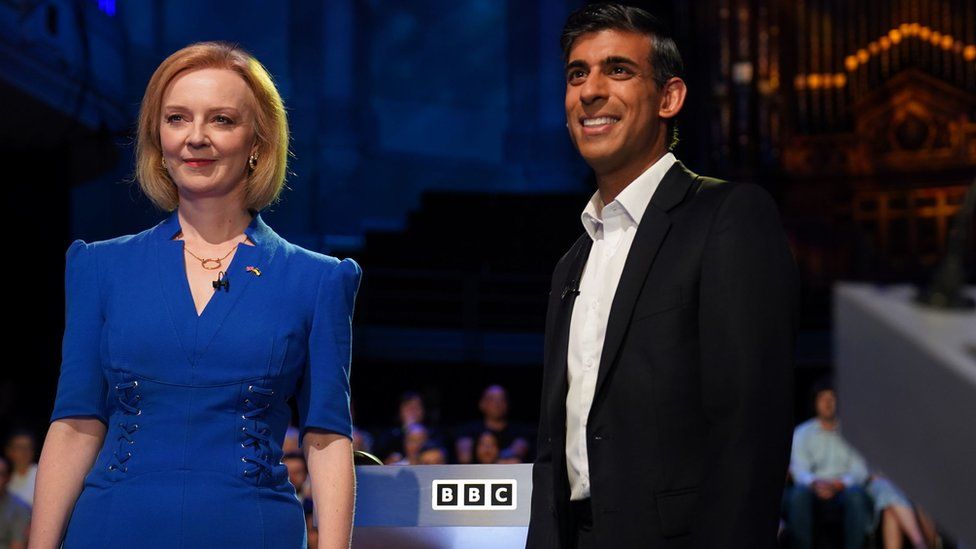ARTICLE AD BOX
By Reality Check
BBC News
 Image source, PA Media
Image source, PA Media
Foreign Secretary Liz Truss and former chancellor Rishi Sunak held their first head-to-head debate as part of the race to succeed Boris Johnson as Conservative leader and prime minister.
Here we look at some of the claims they made.
Liz Truss: 'There is already headroom of approximately £30bn in the budget'
Fiscal headroom is a term for the amount extra that the government could spend without breaking its own rules on borrowing.
After the spring statement in March, the Office for Budget Responsibility concluded that Mr Sunak's policies as chancellor had left about £30bn of fiscal headroom.
But the Institute for Fiscal Studies has pointed out that inflation will eat into that figure. For example, the government's increases to public sector pay will cost billions. Meanwhile, surging inflation led interest payments on UK government debt to hit £19.1bn in June, the highest amount on record.
Rishi Sunak: 'There are millions of homes that need better insulation'
When asked how he would help households with the rising cost of living, Mr Sunak focused on cutting energy bills by helping millions of homes with insulation installation.
Mr Sunak is right that without proper insulation households either use more energy to heat and cool their homes, or for those in fuel poverty they can be forced to live in cold, damp and potentially unhealthy homes.
The Energy Savings Trust estimates that loft insulation could save a terraced house £230 a year on energy bills - but it also would cost £500 to install - hence the need for government support.
However, over the last decade installation rates have fallen. The UK government's advisory body on climate change, the UKCCC, estimated there were just 27,000 lofts insulated in 2020 compared to 1.6 million in 2012.
When Mr Sunak was Chancellor at the Treasury, he announced the green homes grant scheme, which offered £10,000 to homes to help install insulation measures. But then it was scrapped less than a year later after achieving just 10% of its target.
The Environment Audit Committee said the "botched" scheme must be reformed as "investment to improve energy efficiency has been woefully inadequate."
Then, two weeks later the Telegraph reported that the Treasury blocked proposals by Kwasi Kwarteng as Business Secretary to expand the Energy Company Obligation - an energy efficiency scheme to help low income households.
However, more recently in his Spring Statement Mr Sunak did remove VAT on energy efficiency materials for homeowners including insulation.
Liz Truss: 'Since the referendum took place I've delivered dozens of trade deals'
The UK has secured trade agreements with over 60 countries since the Brexit vote. However, the vast majority are "rollover" deals - copying the terms of deals the UK already had when it was an EU member, rather than creating new benefits.
Two deals have been negotiated from scratch - with Australia and New Zealand. The UK's government's own estimate says the Australia deal could increase the UK's GDP by 0.08% over 15 years.
The UK has also negotiated several deals that build on existing EU deals, such as the one with Japan.
Rishi Sunak and Liz Truss: 'No'
This was in the section of the debate when both candidates had to give one-word answers and were asked whether Brexit was to blame for the "huge queues" seen at Dover and Folkestone.
They denied this but Brexit is one of the main factors involved. When the UK was in the EU, there was much less need for rigorous checks at these ports because UK citizens could travel freely around the EU. This "freedom of movement" ended with Brexit and now French officials - at Dover and Folkestone - have to stamp and check passports. The change means more staff and bigger facilities are now required to make the checks.
This can take up to a minute per person - according to travel expert Simon Calder - rather than a few seconds (under the old system). Other factors that contributed to the travel disruption included an initial shortage of French border staff at Dover on Friday.
Sunak: 'But what we do need to acknowledge is that China is a threat to our national security. It's a threat for economic security'
Ahead of the leadership debate, Rishi Sunak tweeted a series of tough new measures he would introduce as prime minister to "face down" China. His proposals included closing all 30 Confucius Institutes in the UK and empowering MI5 to help tackle industrial espionage.
Mr Sunak's position on China has not always been so stark. Speaking as chancellor in a speech last year, Mr Sunak called for a "mature and balanced relationship" with China in order to "pursue with confidence an economic relationship [..] in a safe, mutually beneficial way".
In June 2020 Mr Sunak was reportedly one of several cabinet members who warned Boris Johnson against breaking economic ties with China over security concerns with the 5G network supplier, Huawei.
Mr Sunak's past support for a closer trading relationship with China has been acknowledged by Chinese state-owned newspaper Global Times, who described his approach as "clear and pragmatic".
But Ms Truss has also changed her position China, having said in 2016 that relations with China were entering a "golden era".

 2 years ago
22
2 years ago
22









 English (US)
English (US)